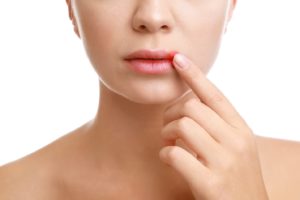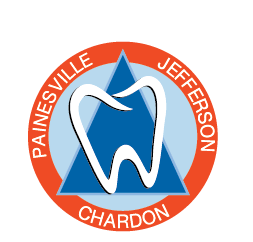
It can be quite startling to wake up one morning, look into your bathroom mirror, and notice a bright red sore on your mouth! When this happens, the first thought on your mind is probably: “What is this and how did it get here?” Fortunately, these sores are much more common than you think and are also both preventable and treatable. Keep reading to learn more from your dentist in Chardon about cankers and cold sores, what causes them, and some tips for handling them.
Cankers vs. Cold Sores: What’s the Difference?
Since they often look and feel similar, the easiest way to tell the difference between a canker and a cold sore is by where it’s located: cankers are usually found inside the mouth, often on your gums, below your tongue, etc. while cold sores typically surround your lips (although in some cases they can also form inside your mouth).
Another common differentiator is the cause; researchers believe that cankers are the result of nutrient deficiencies, stress, injury to the inside of your mouth, or even fluctuations in hormones. On the other hand, the symptoms of a cold sore can depend on if you have a new infection with HSV (herpes simplex virus) or have had it for a while. It’s worth noting that most people are infected with HSV during childhood; kissing and sharing utensils are two common ways that it’s spread. But even though researchers aren’t quite sure what causes canker sores, unlike cold sores, they aren’t contagious.
When You Should Seek Treatment
Even though canker sores and cold sores are both extremely common, you should seek treatment if you experience the following:
- Your sore is abnormally large.
- Your sore isn’t healing after two weeks or occurs several times a year.
- You’re having difficulty eating or drinking.
- You’re experiencing high fever.
Tips for Preventing Cankers & Cold Sores
Cankers and cold sores can both be uncomfortable and debilitating—even if they normally clear up on their own—so preventing them from occurring in the first place is your best bet! Consider the following for reducing your risk of getting a canker or cold sore:
- Maintain good oral hygiene (brush twice a day, floss, and use an antibacterial mouthwash).
- Eat a well-balanced diet and drink plenty of water.
- Avoid consuming large quantities of spicy, acidic, or extra-salty foods.
- Use SPF lip balm and avoid triggering situations.
- Practice relaxation techniques to manage stress.
- Consider using over-the-counter pain relievers and cream to manage pain.
Mouth sores can be quite irritating and can negatively affect the look and feel of your smile. But fortunately, these issues don’t have to plague you forever; if the issue isn’t clearing up on its own, don’t hesitate to speak with your dentist about treatment options.
About the Author
Dr. Nicholas Slezak proudly serves patients and families in the Chardon, OH area. Dr. Slezak received his dental doctorate from Case Western Reserve University and is a member of several professional organizations including the American Dental Association and the Ohio Dental Association. His practice is pleased to offer many available services including preventive, cosmetic, and restorative dentistry options. If you’d like to schedule a visit, feel free to visit Dr. Slezak’s website or give his office a call: (440) 286-8211.
